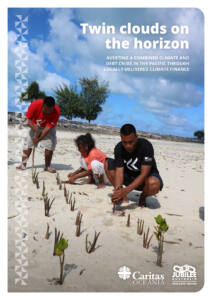
WelCom December 2022
Caritas Aotearoa New Zealand is deeply concerned carbon-cutting commitments under the Paris Agreement on climate change still leave the world facing a 2.5°C temperature rise – and that’s if countries deliver on their promises.
‘It seems the “1.5 to stay alive” call from the Pacific has still not been taken on board,’ Caritas Director Mena Antonio said following the end of the COP27 UN climate change conference in Egypt last month. ‘There is no timeline for countries to reduce reliance on fossil fuels and fossil fuel subsidies that are causing damage to our common home, and no increased ambition to cut emissions – only a repetition of promises to “accelerate efforts”.
‘While we welcome the agreement to establish a special loss and damage fund – this fund needs to deliver for those bearing the brunt of climate change – both in quantity and quality,’ said Ms Antonio.
‘Unless properly drawn up with input from those who are already suffering loss of land, livelihoods and cultures, this new fund runs the risk of becoming just another climate fund that will be inaccessible to local communities and not meet the urgent needs of those impacted the most.’
Caritas Aotearoa New Zealand contributed to a joint Caritas Oceania/Jubilee Australia report on climate finance and debt launched shortly before COP27. The report Twin clouds on the horizon called for reform of the global climate finance structures to address barriers to access, including mechanisms to deliver finance directly to local communities.
‘Affected local communities need to be empowered to deliver, monitor and evaluate climate-related projects. The needs of the poorest and the most vulnerable – such as women, girls and people with disabilities – need to be prioritised for access,’ Ms Antonio said.
Caritas commends the New Zealand Government for its expanded climate finance strategy, and consultation with Pacific Island leaders and civil society for effective delivery through new mechanisms and looks forward to more detail in the New Year.